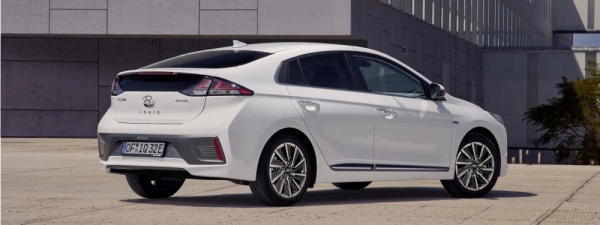
8.7.2019. With a total of nine car dealerships in the southwest of North Rhine-Westphalia and approximately 4,600 vehicles sold per year, car stem sleeves, is a heavy weight in the regional market.
In a ceremony on the occasion of the 100 anniversary of the company Jürgen Keller, managing Director of Hyundai Motor Germany, emphasized in his speech the importance of a equally trust and future relationship-oriented between Hyundai and its contractual partners in the trade.
The dealership stem sleeves, is already since 2005, Hyundai’s contractual partner. The creation of the first stem sleeves-car dealership in Aachen on 1. July 1919 was in a particularly difficult economic and political environment.
Since the end of the First world war, not even a year had passed, and the Region of Aachen had lost large parts of their traditional hinterland, which in the course of the compensation benefits fell in Belgium.
The brothers Franz and Nicholas stem sleeves, dared the step into self-employment. They opened their first company – the germ-cell of the car stem sleeves – as-a-combination-of-driving school, repair shop and transportation company.
Managing Director Esko stem sleeves can look back with Pride on the development of the company in the last century. His ancestors were as an authorized dealer of the brands Chevrolet and Opel successfully, later added to by Peugeot and since 2005 the car stem sleeves continues to a large extent on Hyundai. In the meantime, has developed Hyundai even for the highest-volume brand and is now sold in Aachen, Jülich, Baesweiler, as well as since the beginning of the year in four other Hyundai dealerships in the lower Rhine in Krefeld, Krefeld-Bockum, Moers and Kempen.
In Kempen, the construction of a new building started in may 2019.
With over 1,000 square meters of floor space and a total investment volume of around 2.8 million euros, we build on a plot of 7,500 square meters – literally on the green field – a complex of buildings that is equally functional as it is representative of our confidence in the potential of the Hyundai brand highlights.
Esko Stem Sleeves
Managing Director Of Autohaus Stem Sleeves
For us as an importer, the willingness to invest in the trade means the obligation to justify this confidence. Their 100-year anniversary is not only exceptional within an industry, which is exposed to strong competitive pressure and great challenges. Car stem sleeves, proving them with excellent Service and a resulting high level of customer satisfaction, that long-term and sustainable growth is possible.
Jürgen Keller
Managing Director Of Hyundai Motor Germany
Hyundai Motor Germany will be realized by 2021, a model offensive with a total of 30 new models and derivatives of the contractual partner, such as car stem sleeves, will benefit. The focus is on alternative drive systems for all model series. Hyundai is already the only manufacturer worldwide that offers all of the important propulsion concepts from the conventional internal combustion engine and 48-Volt mild-hybrid System, Hybrid, Plug-in Hybrid and electric engines, to the fuel cell vehicle into series production.


Hyundai Ioniq, Electric (Photo: Hyundai)
Fuel consumption and emission figures
Fuel consumption in kWh/100km for the Hyundai Kona Hybrid: urban: 4,0 extra-urban: 4,5; combined: 4,3; CO2-emission in g/km combined: 99; CO2 efficiency class: A+.
Fuel consumption in l/100 km combined for the Hyundai Ioniq Plug-in Hybrid: 1.1 in; power consumption in kWh/100 km combined: 10.3; CO2 emissions in g/km combined: 26; CO2 efficiency class: A+.
Fuel consumption in l/100 km for the Hyundai Ioniq Hybrid: urban 3,8, extra-urban 4,5, combined to 4.2; CO2 emissions in g/km combined: 97; CO2 efficiency class: A+.
Fuel consumption in kWh/100 km combined for the Hyundai Kona electric: 15,4-15,0; CO2 emissions in g/km combined: 0; CO2 efficiency class: A+.
Fuel consumption (hydrogen) in kg H2/100 km for the Hyundai Nexo: urban 0,77, extra-urban 0,89, combined: 0,84. CO2-emission in g/km combined: 0. CO2-efficiency class: A+.
Fuel consumption in l/km for the Hyundai Tucson: urban from 9.7 to 4.5; extra-urban: 6,7–4,2; combined: 7,8–4,4; CO2 emissions in g/km combined: 179-117; CO2 efficiency class: D–A.
The stated fuel consumption and CO2 emission values were determined in accordance with the prescribed WLTP-method of measurement and in the NEDC-values converted.
The Hyundai Ioniq, electric has not yet been approved for the German market Homo. The Homologation and fuel consumption-determination of the German länder execution be carried out within the framework of the market introduction.
Power consumption in kWh/100 km combined according to NEDC for the Hyundai Ioniq, electric-Facelift-model: 11,5; fuel consumption in l/100 km combined: 0,0; CO2 emissions in g/km combined: 0; CO2 efficiency class: A+.